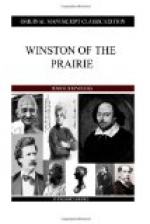Maud Barrington, who was of patrician parentage, and would not at one time have questioned this assertion, wondered why she felt less sure of it just then.
“But if he had not been, would not what he has done be sufficient to vouch for him?” she said.
Barrington smiled a little, and the girl felt that her question was useless as she glanced at him. He sat very straight in his saddle, immaculate in dress, with a gloved hand on his hip, and a stamp which he had inherited, with the thinly-covered pride that usually accompanies it from generations of a similar type, on his clean-cut face. It was evidently needless to look for any sympathy with that view from him.
“My dear,” he said, “there are things at which the others can beat us; but, after all, I do not think they are worth the most, and while Lance has occasionally exhibited a few undesirable characteristics, no doubt acquired in this country, and has not been always blameless, the fact that he is a Courthorne at once covers and accounts for a good deal.”
Then Winston recognized them, and made a sign to one of the men behind him as he hauled his binder clear of the wheat. He had dismounted in another minute, and came towards them, with the jacket he had not wholly succeeded in struggling into, loose about his shoulders.
“It is almost time I gave my team a rest,” he said, “Will you come with me to the house?”
“No,” said Colonel Barrington. “We only stopped in passing. The crop will harvest well.”
“Yes,” said Winston, turning with a little smile to Miss Barrington. “Better than I expected, and prices are still moving up. You will remember, madam, who it was wished me good fortune. It has undeniably come!”
“Then,” said the white-haired lady, “next year I will do as much again, though it will be a little unnecessary, because you have my good wishes all the time. Still, you are too prosaic to fancy they can have anything to do with—this.”
She pointed to the wheat, but, though Winston smiled again, there was a curious expression in his face as he glanced at her niece.
“I certainly do, and your good-will has made a greater difference than you realize to me,” he said.
Miss Barrington looked at him steadily. “Lance,” she said, “there is something about you and your speeches that occasionally puzzles me. Now, of course, that was the only rejoinder you could make, but I fancied you meant it.”
“I did,” said Winston, with a trace of grimness in his smile. “Still, isn’t it better to tell any one too little rather than too much?”
“Well,” said Miss Barrington, “you are going to be franker with me by and by. Now, my brother has been endeavoring to convince us that you owe your success to qualities inherited from bygone Courthornes.”
Winston did not answer for a moment, and then he laughed. “I fancy Colonel Barrington is wrong,” he said. “Don’t you think there are latent capabilities in every man, though only one here and there gets an opportunity of using them? In any case, wouldn’t it be pleasanter for any one to feel that his virtues were his own and not those of his family?”




